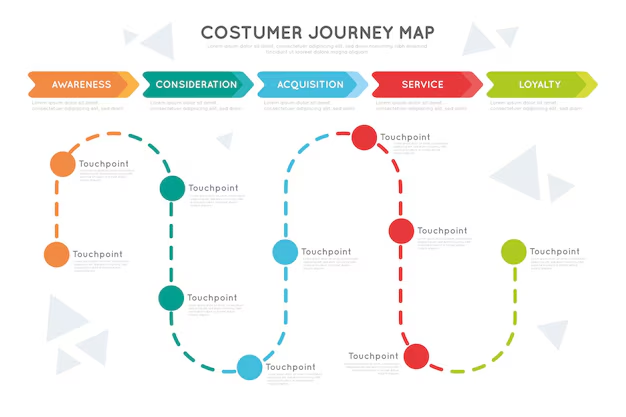How to Create a Customer Journey Map
October 11, 2021

0
Shares
The importance of understanding the customer’s journey through your business remains an important aspect to be considered when designing processes that are aimed at enhancing the smooth running of your business. Regardless of the size of a business, one common factor is that there must be a customer journey. Determining what that journey is, depends on the aim of the business and the strategy it has adopted. It is vital that small business owners know the importance of understanding the customer’s journey as it aids the customer experience design and management.
To appreciate the concept of the customer journey, let us attempt a definition. From the first contact with your business to the completion of the transaction, there is a story to be told…… the customer’s story. The customer journey simply refers to the summation of the customer’s experience in making a purchase, be it a service or product. It is a tool used to visualize what your customers’ experience is through your business. It is the assessment of your business value promised to the customer.
Say you own a boutique along Adeniran Ogunsanya in Lagos and your value proposition is “your one-stop-shop”. Anyone walking into your boutique will be expecting to get everything relating to fashion there, right? Let’s draw up some questions to help us identify the possible customer touchpoints in this kind of business.
1. Is it easy to locate (brand visibility)?
2. In comparison to your competitors, how likely is your prospective customer to find you?
3. Available parking space for customers who drive-in?
4. Is it easy to park a vehicle without it being towed by the government authorities?
5. Is there available security personnel?
6. Is he or she warm, welcoming, and helpful?
7. Upon entering the boutique, is there personnel to welcome the customer?
8. Are the items displayed properly with the price tags attached?
9. Is the sales personnel knowledgeable and helpful?
10. Did the customer find what he or she was looking for to buy?
11. If not, what was the next course of action, the customer walks away?
12. If yes, was the price competitive?
13. If not, did the sales personnel cross-sell or offer an acceptable alternative, or did the customer walk away?
14. If the Customer wants the item, how was it packaged?
15. Did the salesperson thank the customer after the transaction?
16. Transaction completed, what next?
With the questions above, one can pretty much draw the customer journey map for this business. When business owners have a clear picture of what their customers go through within their business, it makes it easy for them to spot a point in the journey that needs to either be removed or reviewed. It is recommended that when creating a customer journey map for your business, do it with an outside-in approach. This simply means designing it with optimizing the convenience of the customer in mind.
Benefits of Having a Customer Journey Map
Having a customer journey map brings many benefits to a business including:
It will help you identify ways to serve your existing customers better.
It helps you identify your potential customers.
It helps you identify shortcomings in your business.
It helps position the business to increase productivity
It gives all stakeholders in the business a bird’ eye view of the customers’ experience and guides their role in enhancing it.
Tips to Note When Creating a Customer Journey Map
Identify your buyer personas. Knowing who your likely buyers will be, will guide your design process.
Identify and include all participants in the customer’s journey. This means that you can’t design it alone. Involve your staff. They get to interact more with the customers and can provide valuable insights to improve the customer’s experience.
Build the map around measurable KPIs (key performance indicators) so that each outcome can be measured to check its impact on business profitability.
Be mindful to include points for empathy. In our sample questions above, you will easily identify moments of empathy. It is a major customer experience driver in today’s business world.
The above tips are not exhaustive. Your customer journey map can be designed uniquely for your business. The essential thing to note is that when your customer’s moment of truth reflects your own moment of truth about your business, it would be one of two things: you may either be doing something correctly or you need to review your business process.
Hope you found this useful.
Your thoughts?
Post Views: 215

